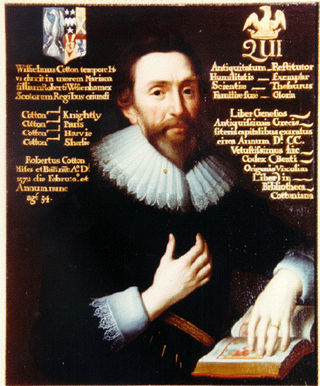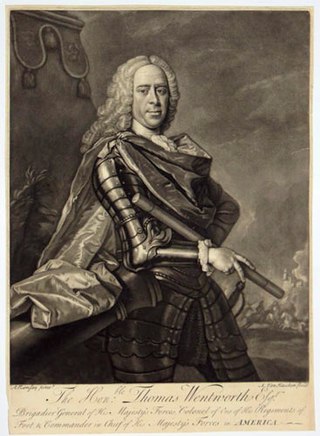
Earl of Lucan is a title which has been created twice in the Peerage of Ireland for related families.

Baron Lyttelton is a title that has been created once in Peerage of England and twice in Peerage of Great Britain, both times for members of the Lyttelton family. Since 1889 the title has been a subsidiary title of the viscountcy of Cobham.

Viscount Cobham is a title in the Peerage of Great Britain that was created in 1718. Owing to its special remainder, the title has passed through several families. Since 1889, it has been held by members of the Lyttelton family.

Earl of Lindsay is a title in the Peerage of Scotland. It was created in 1633 for John Lindsay, 10th Lord Lindsay, who later inherited the ancient Earldom of Crawford. The two earldoms remained united until the death of the 22nd Earl of Crawford, also sixth Earl of Lindsay, in 1808. Then the earldom of Lindsay passed to David Lindsay, while the earldom of Crawford became dormant because no-one could prove a claim to the title until 1848. Both David, 7th Earl of Lindsay, and his successor Patrick, 8th Earl of Lindsay, died without sons, and the disputed claim over the earldom was resolved by the House of Lords in 1878 in favour of Sir John Trotter Bethune, 2nd Baronet.

Baron Hatherton, of Hatherton in the County of Stafford, is a title in the Peerage of the United Kingdom. It was created in 1835 for the politician Edward Littleton, Chief Secretary for Ireland from 1833 to 1834. Born Edward Walhouse, he assumed in 1812 by Royal licence the surname of Littleton in lieu of his patronymic on succeeding to the estates of his great-uncle Sir Edward Littleton, 4th and last Baronet, of Teddesley Hall. He was also heir to the substantial Walhouse estates and interests, which included Hatherton Hall, near Cannock, then in an exclave of Wolverhampton. His wealth was based upon landed estates centred on Penkridge in southern Staffordshire, mines at Great Wyrley and Bloxwich, quarries and sandpits, brick yards and residential housing, mainly in Walsall.

There have been three Baronetcies created for persons with the surname Cotton, all in the Baronetage of England. One creation is extant as of 2008.

Three baronetcies have been created in the Baronetage of England for members of the Littleton or Lyttelton family. All three lines are descended from Thomas de Littleton, a noted 15th-century jurist. Despite differences in the spelling of the title, the names of all three lines were spelt in many varied ways in the early modern period, without distinction between the different branches of the family. This can be confusing, as the range of forenames in use was very limited.

Sir Thomas Holte, 1st Baronet was an English landowner, responsible for building Aston Hall, in the parish of Aston in Warwickshire. The "Holte End" stand of Villa Park, the stadium of Aston Villa Football Club, sits on land originally part of the Aston Hall gardens and is named after Thomas Holte. The area also has a Holte School and Holte Road.

Lieutenant-General Thomas Wentworth, of Sunninghill, Berkshire, was a British Army officer and politician who sat in the House of Commons from 1743 to 1747. He served in the War of Jenkins' Ear and the Jacobite rising of 1745.
Edward Littleton may refer to:
The Pretyman Baronetcy, of Lodington, was a title in the Baronetage of Nova Scotia. It was created in circa 1660 for John Pretyman, later member of parliament for Leicester. The title became dormant on the death of the fourth Baronet in circa 1749. In 1823, George Pretyman Tomline, the Bishop of Winchester, successfully claimed the Baronetcy but his sons refused their claims to succession and it became again dormant.
The Hungate Baronetcy, of Saxton in the County of York, was a title in the Baronetage of England. It was created on 15 August 1642 for Philip Hungate. The title became extinct on the death of the sixth Baronet in 1749.
The Castleton Baronetcy, of St Edmundsbury in the County of Suffolk, was a title in the Baronetage of England. It was created on 9 August 1641 for William Castleton, High Sheriff of Suffolk from 1641 to 1642. The second Baronet was High Sheriff of Suffolk from 1660 to 1661. The sixth Baronet was Rector of Gillingham, Norfolk. The eleventh Baronet was Rector of Thornham, Norfolk. The title became extinct on the death of the twelfth Baronet in 1810.
There have been two baronetcies created for persons with the surname Pickering, one in the Baronetage of Nova Scotia and one in the Baronetage of England. Both creations are extinct.
Sir Richard Osbaldeston was an English barrister who became Attorney General for Ireland. He was the great-grandfather of Richard Osbaldeston, Bishop of London.
Sir Edward Littleton of Pillaton Hall, 2nd Baronet, was a Staffordshire landowner and MP from the extended Littleton/Lyttelton family, who represented Staffordshire in the Cavalier Parliament.

Sir Edward Littleton of Pillaton Hall, 4th Baronet, was a long-lived Staffordshire landowner and MP from the extended Littleton/Lyttelton family, who represented Staffordshire in the Parliament of Great Britain and the Parliament of the United Kingdom for a total of 28 years. The last of the Littleton Baronets of Pillaton Hall, he transferred the family seat from eponymous Pillaton to Teddesley Hall, and died childless, leaving the estates to his great-nephew, Edward Walhouse, who became Edward Littleton, 1st Baron Hatherton.
There have been five baronetcies created for persons with the surname Tyrrell, all in the Baronetage of England. All five creations are extinct, as is the Tyrell baronetcy. The six creations all claim a descent from Walter Tirell, the reputed accidental killer of King William II.

The Lyttelton family is a British aristocratic family. Over time, several members of the Lyttelton family were made knights, baronets and peers. Hereditary titles held by the Lyttelton family include the viscountcies of Cobham and Chandos, as well as the Lyttelton barony and Lyttelton baronetcy. Several other members of the family have also risen to prominence, particularly in the field of cricket.
Sir Thomas Wroth, 3rd Baronet (c.1674–1721) of Petherton Park, Somerset was an English High Sheriff and Member of Parliament.










